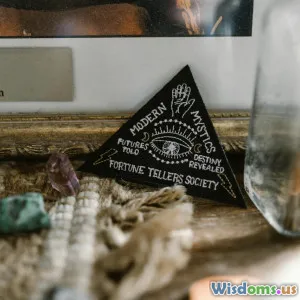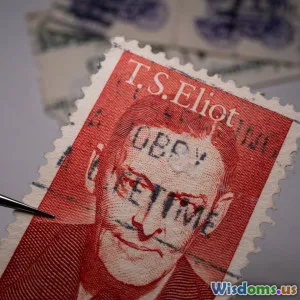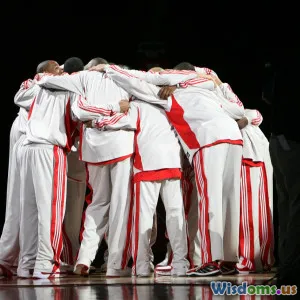
Inside a Modern Secret Society Initiation: Firsthand Account
8 min read A deep dive into the mysterious, fascinating world of modern secret society initiations from a firsthand perspective. (0 Reviews)
Inside a Modern Secret Society Initiation: Firsthand Account
Secret societies have long fascinated the public imagination—cloaked in mystery, woven with rituals, and shrouded behind a veil of secrecy. While folkloric imaginations might visualize shadowy cloaks and arcane chants, the modern reality often blends tradition with contemporary interpretations. This article offers an insider’s perspective on a modern secret society initiation, unraveling the intricate ceremonies, symbolism, and emotions involved.
The Allure and Purpose of Secret Society Initiations
At the core, initiations are transformational moments—rituals designed to induct newcomers into the society’s ethos, philosophy, and culture. As renowned sociologist Victor Turner famously asserted, rites of passage like initiations serve as liminal experiences where individuals leave behind a previous state and enter a new identity phase.
Modern secret societies adopt this archetype to cultivate unity, shared values, and exclusivity. However, contrary to many sensationalized accounts, these ceremonies prioritize spiritual symbolism, intellectual bonding, and commitment rather than supernatural elements.
First Impressions: The Approach to Secrecy
Upon arrival at the designated location—typically a discreet venue such as a historic private club or a secluded estate—the atmosphere transforms. Masquerade masks, whispered conversations, and minimalist illumination symbiotically create an aura of intrigue and solemnity.
The candidate is usually met by a senior member acting as guide and peacekeeper. One powerful element experienced during the initiation was the heavy silence punctuated by ritualistic cues, reinforcing the gravity of the event. This environment induces heightened focus, sharpening the senses and eliminating everyday distractions.
Example: In the documented case of an Ivy League secret society, initiates were blindfolded and led through a labyrinthine hallway lined with portraits of past luminaries, symbolically linking newcomers to a legacy stretching back generations.
The Rituals and Symbolism
The Vow and Commitment
Most initiations feature a solemn vow or pledge. This is often recited aloud in a symbolic chamber or hall, promising confidentiality, loyalty, and adherence to the society’s principles. The wording can be poetic yet deliberate, invoking a blend of personal responsibility and respect for tradition.
Symbolic Objects and Gestures
Physical objects such as rings, badges, or specific tokens are handed to initiates. These serve as tangible reminders of their membership and the society’s values. In some modern societies, these may be technologically enhanced, such as cryptographically secured membership cards.
In the firsthand narrative shared by the initiate, the ritual included the passing of a small, elaborately engraved key said to metaphorically “unlock knowledge.” This practice echoes historical secret society symbolism where keys represented access to hidden wisdom.
The Role of Storytelling
An essential and often overlooked element in these ceremonies is storytelling. Senior members recount foundational myths, key historical moments, or allegorical tales that encode the society’s norms and aspirations. Hearing these stories fosters a sense of identity and connection, emphasizing that membership means becoming part of a living tradition.
Psychological and Social Dynamics
The psychological architecture of the initiation experience is carefully designed to build trust, humility, and camaraderie.
Inducing Shared Vulnerability
Moments such as being guided blindfolded or reciting personal vows serve to create instances of shared vulnerability. Social science research shows that shared vulnerability encourages group bonding and trust formation (Brown, 2012).
Building an Insider Identity
The use of secret signs, coded language, and exclusive knowledge fosters an insider identity. This creates an in-group cohesion which, according to social identity theory, improves commitment and motivation (Tajfel, 1974).
Furthermore, these dynamics help newcomers transition psychologically from outsiders to accepted members.
Facilitating Transformation
Some ceremonies involve symbolic rebirths—such as washing rituals or symbolic darkness-to-light transitions—to underline the candidate's transformation. Modern secret society initiations often include personalized reflections on the individual’s responsibilities and new role within the community.
The Emotional Journey
The firsthand initiate described an emotional arc beginning with anxious curiosity, moving through humility and introspection during moments of silence and ritual, and culminating in a profound sense of belonging and purpose.
This emotional progression is integral, as initiations are crafted not only to define social membership but also to inspire personal growth. The shared emotional intensity often creates lasting bonds that extend beyond the ceremony itself.
Dispelling Myths: What Modern Secret Society Initiations Are Not
It is important to clear misconceptions often perpetuated by popular media:
- No sinister conspiracies: While confidentiality is strict, most societies focus on networking, philanthropy, or intellectual development rather than conspiratorial scheming.
- Not about supernatural powers: Symbolism is designed for meaning and mindset shifts, not magical transferrals.
- No coercion or harmful acts: Ethical standards are carefully maintained. Candidates consent comfortably and voluntarily.
Conclusion: Why Understanding Initiations Matters
The detailed glimpse into a modern secret society initiation demystifies an otherwise opaque process and reveals its timeless function: creating community through shared ritual. Far from being relics or shadowy cults, contemporary initiations blend heritage and symbolism to empower members psychologically and socially.
Such an understanding encourages a more nuanced appreciation of how organizations, secret or not, foster belonging and identity in an increasingly fragmented world. For anyone intrigued by human behavior, social cohesion, or organizational culture, the initiation rite stands as a vivid living example of ancient customs continually adapting to modern needs.
References:
- Turner, Victor. "The Ritual Process: Structure and Anti-Structure." 1969.
- Brown, Brené. "Daring Greatly." 2012.
- Tajfel, Henri. "Social Identity and Intergroup Relations." 1974.
- Case studies from historically documented secret societies such as the Skull and Bones at Yale.
This firsthand account showcases the power of initiation rites to transform, bind, and inspire—echoing their pivotal role in human social history.
Rate the Post
User Reviews
Popular Posts





















